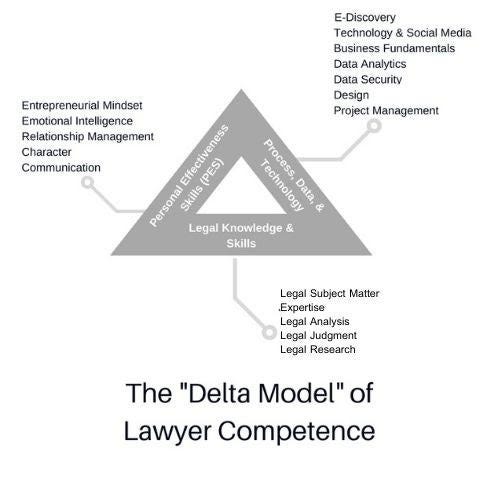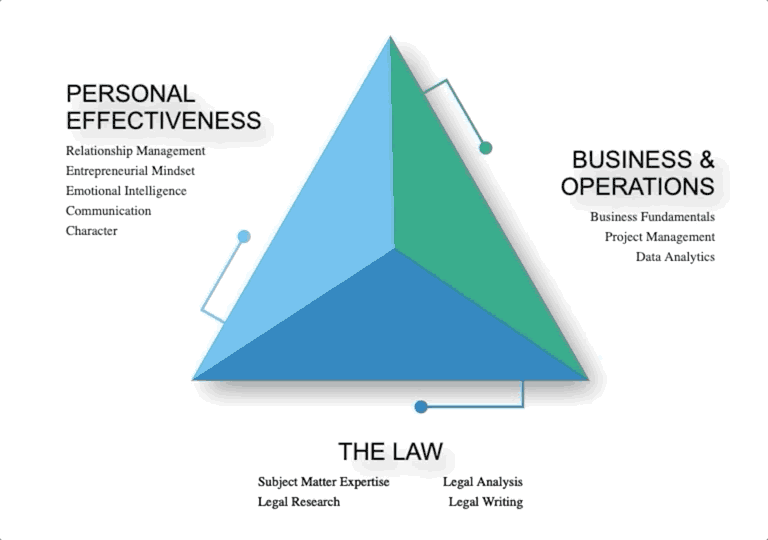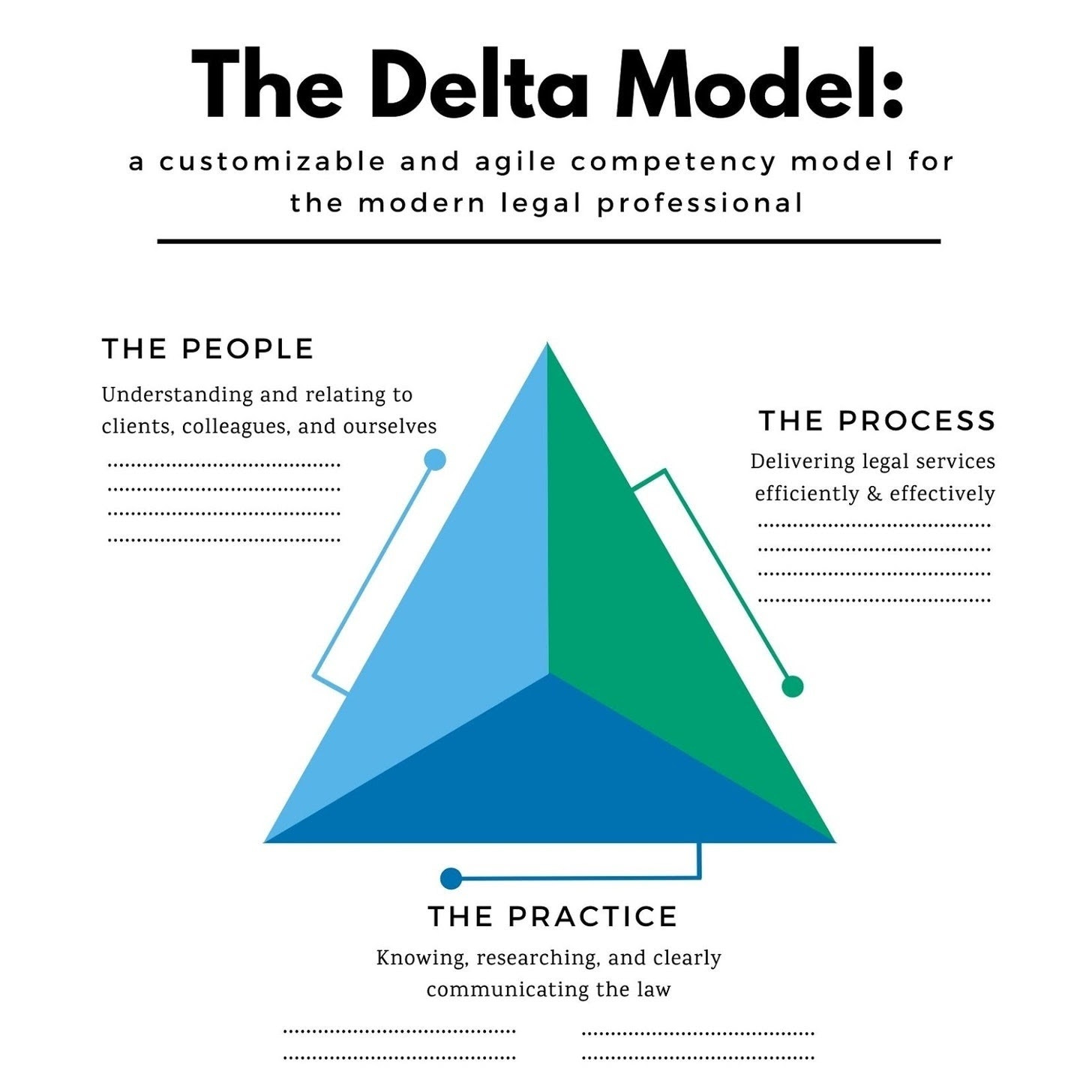The Delta Model: An Evolution for a Revolution
Design Your Delta No. 8
“In my research and in my work with law firms, I have been exposed to a large number of competency models. Yet I’ve never come across one as compact, relevant and durable as the Delta Model.” - Professor Bill Henderson
So what is the Delta Model?
The Delta Model is a competency framework consisting of three broad areas that legal professionals need to succeed professionally and thrive personally. It is a visual framework to understand and assess the present state of legal work, as well as to understand and chart a path for the future.
Over time, the Delta Model has evolved to become more simplified, more dynamic, more flexible, broadly applicable, and agile; it is now poised to not only guide the legal profession through this Liminal Age of Legal but transform the profession to better reflect the changing nature of legal services, as well as meet the needs of a changing society.
It is Holistic
Since its inception, the Delta Model has represented a holistic approach for understanding the growing role of technology and innovation in the delivery of legal services while recognizing the continued (and increasing) value of emotional intelligence. Visualized as a triangle, the Delta Model incorporates the Greek symbol for change, to reflect the concomitant evolving nature of legal services.
As initially conceived, each side of the triangle represents a skill set related to the following three broad areas of competency:
traditional legal skills & knowledge;
the effective and efficient delivery of legal services;
and the ability to relate to and understand our clients, our colleagues, and ourselves.
It is Dynamic
The Delta Model’s midpoint shifts according to context. The shifting midpoint illustrates how different roles within the legal profession require different arrays and depths of skills. The model could now visualize the differing depths of skill level for an infinite number of career options. And by visualizing an infinite number of career options within a single model, no career option is inherently valued over another. Each career option exists within the model, without judgment.
It is Broadly Applicable
The latest version associated with Design Your Delta identifies the three competency areas: The Practice, The Process, and The People. In previous versions, the model had used labels such as Legal Knowledge & Skills; Process, Technology & Date; Business & Operations; and Personal Effectiveness Skills. Although descriptive, we found that the word “Business” unintentionally led some users to perceive the model more narrowly and only applicable to for-profit law firms. However, the model accommodates all legal roles, regardless of organizational structure.
“The Delta Model’s most compelling feature, however, is its simplicity . . . Indeed, I can’t identify a meaningful omission. Likewise, they seem to have hit the limit of less is more. To the Delta Model working group, all I can say is ‘Bravo!’” - Professor Bill Henderson
It is Agile
In previous iterations, the Delta Model identified skills based on previous research that demonstrated a need to broaden the skillsets of young attorneys, as well as original research conducted by Thomson Reuters and the working group who first developed the model in 2018.
All the research demonstrated a need for a more holistic understanding of the skills necessary to succeed as a 21st-century legal professional, but which specific skills were necessary depended on the focus of the research. Arguably, it is impossible to capture EVERY specific skill needed to succeed in such a simple model (although some have tried: see IAALS Foundations for Practice Project). Thus, the latest iteration of the Delta Model no longer lists specific skills under each competency. This allows organizations to choose the top skills in each competency to best reflect its values and culture, the practice area’s unique needs, or the career’s unique role in the profession.
In addition, the specific skills needed to succeed are under review and could/should evolve. We are in the midst of the Liminal Age of Law, a transition impacted by a changing society. As our clientele and profession become increasingly diverse, our profession must reckon with the structural racism embedded in its system.
Researchers have demonstrated that tests such as the LSAT and skills assessed in law school and on the bar exam have a disparate impact on black individuals. We use this research to inform the model, but we must recognize that so much more work needs to be done to understand the ways in which the legal education system, let alone the legal system more broadly, perpetuate racist and discriminatory ideas.
Therefore, ANY competency model used to inform and develop the profession must be agile, to change based on new understandings and needs, and reflect the evolution and innovations taking place. The Delta Model does this.
By removing the specific skills listed under each competency, we provide space for the profession to reflect growth and evolution, to become more inclusive, and to adapt to the increasingly advancing technology and innovations. We thereby transform the prescriptive nature of the model into a framework. A framework that provides guidance, yes, but does not predict or dictate what is expected or required. This framework allows for individualization and tailoring to match the unique needs/culture/specialties of a given organization or entity and to continually evolve to reflect the needs of the time.
As we continue to iterate the model and create a set of corresponding design tools for professional development, we seek to test the strength of this model. We do this by talking to diverse individuals, across the legal spectrum, who need to adapt to the changing nature of legal services, and to the individuals who need the profession to adapt to the changing needs of society.
Honestly, we just want to help move the needle forward, and we humbly submit the Delta Model as a way to do so. We certainly aren’t alone in identifying the wicked problems facing the profession. But we believe the Delta Model may be uniquely situated to help our profession navigate the changes, challenges, and opportunities before us.
June 1, 2021





